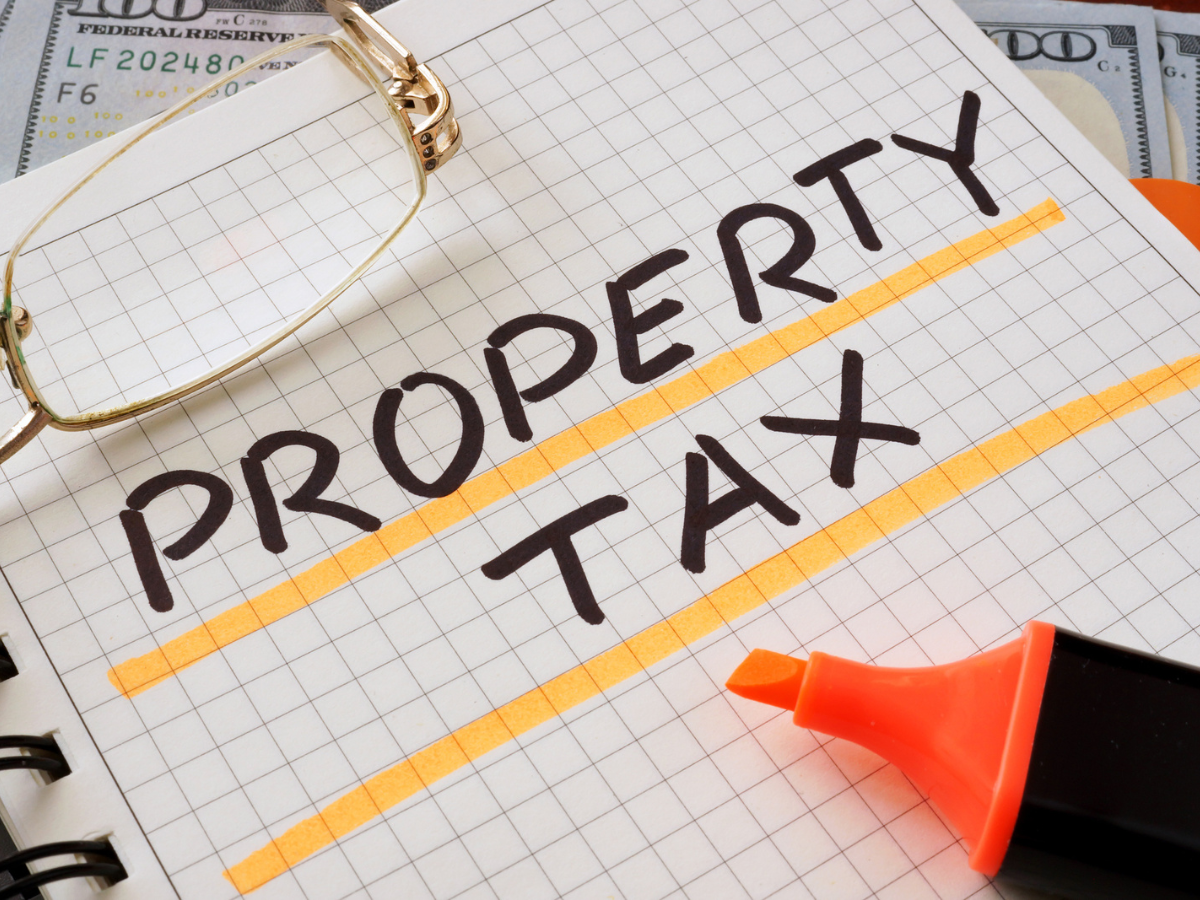Share the post "Rising Property Taxes in Texas: Causes and Consequences"
Texas is the third fastest-growing U.S. state since 2010 and has seen its population increase by over 20%. Since the pandemic, there has been a massive influx of people to its major cities. The Lone Star State is undoubtedly one of the places to be over the past few years.
Many new Texans claim that tax rates were a major reason for moving. Texas doesn’t have an income tax, so residents can feel the total value of their paychecks. However, Texas homeowners are among the highest property tax-paying people in the entire country.

Why Are Texas Property Taxes So High?
Texas property rates are the sixth highest in the U.S. and most indications point toward the rates remaining or potentially, getting even higher. At present, there are three main reasons for this. But first, it’s important to understand how Texas property taxes are determined.
The truth is, the Texas property tax rate formula is relatively straightforward. In a nutshell, the rate is based on the value of the property, minus any exemptions the owner is entitled to. We’ll touch on exemptions in more detail a little later on. So, if your home is twice as valuable as the next, your rates should be double.
Now, while you might be put off by the comparative property tax rates in Texas, you shouldn’t be too concerned. The total tax burden per Texas resident is about the national average. Considering its world-class cities and countless attractions, this is a major bonus.
By comparison, citizens of prominent states like New York, California, Illinois, Nevada, Pennsylvania, Oregon, and Washington pay significantly more (per capita). As mentioned, Texas residents don’t pay income tax, and the state’s sales tax is relatively low.
Yet still, the property tax rates are over a third higher than the national average. So, why are Texas property taxes so high? Here are three of the most influential factors at the moment.
Reliance On Property Taxes
The local governments of Texas rely considerably on property taxes to pay for vital services like police, firefighters, libraries, infrastructure, parks, and publicly funded programs. Property tax is the primary financial source that compensates for the lack of income tax.
Unfortunately, public services will always be necessary so with a state as big as Texas, property taxes are likely to be at least somewhat higher than in other regions. While the state government is looking at ways to combat the continuous rise of property taxes, total reform is unlikely.
If a structural reform was seriously considered, the most obvious solution would be to reconfigure where the lion’s share of tax revenue comes from. This would most likely mean introducing income tax or increasing other rates. Ultimately, this would just be redistribution and the legal proceedings required to pull this off are considerable.

Booming Property Market
Increases in housing demands have caused prices to soar all around Texas over the past few years. Major cities like Austin, Houston, Dallas, and San Antonio have experienced spikes in sales volumes and increases in property prices recently, which have compounding effects on property taxes.
While there are annual limitations on how much the tax rates can increase by, several years of high demand has a massive impact. And although this type of market is beneficial if you’re selling houses, it doesn’t bode well for your yearly tax payments.
By law, Texas homeowners must have their property appraised at least once every three years. So, even if you manage to maintain your property tax rate during this time, there’s a good chance it’ll increase when the period is over. It’s also important to note that the value of the home is separate from a sale or asking price.
Either way, high demand for property in Texas results in value increases, which ultimately means increased taxes. And while prices have stabilized somewhat of late, they are still significantly higher than they were just three or four years ago.
Growing Population
Texas is the second state in the U.S. to reach a population of 30 million. Only California has more people. The population has been increasing steadily since 2000 and has been one of the fastest-growing states in the entire country for approximately 20 years.
Naturally, the more people move to a region, the higher the demand for property. But the increase in population isn’t down to domestic migration alone. In fact, unlike many of the other “fastest-growing” states, the population increases in Texas are spread across all the core categories of population change.
Interestingly, approximately half of Texas’s “new population” since 2000 were born within the state. The other half is a combination of domestic migration and international migration. So, in reality, the value of Texas property has been increasing with its population resulting in the taxes climbing higher and higher.
In recent years, several major corporations relocated from California to Texas. The Lone Star State is growing its profile as a corporate destination, attracting professionals and families at the same time. So, when you consider these three factors, it’s clear to see why Texas property taxes are so high right now.

Texas Property Tax Exemptions
Technically speaking, the property tax rate isn’t governed by the state, it’s determined locally by regional assessors and administered by relevant district bodies. Local governments then use the funds to pay for services like schools, roads, police, emergency response, etc.
This means that depending on where you’re located, your tax rate can vary somewhat. However, there are other means to reduce your property tax burden too. Within the state of Texas, you can benefit from tax exemptions. There are two main types of these exemptions: partial or total.
Partial exemptions allow you to deduct a specific amount or a set percentage from the tax burden after appraisal. A total exemption means that the full tax appraisal amount from your property is deducted, so you owe no property tax. Some tax deductions are mandatory while others are optional for the local administrators.
In general, property tax exemptions must be applied for through the appraisal district where your property is situated. The chief appraiser within your district is the only person responsible for deciding if your property is granted an exemption or not. While these applications are extensive, they can save you a lot of money.
There are seven categories for property tax exemptions so in order to avail of one, your circumstances must align with one of these provisions.
- Residence Homestead
In school districts, some homeowners avail of an exemption of $40,000 or up to 20% of the property’s appraised value. To qualify for such exemptions, the person benefitting must have at least an ownership interest and use the property as their primary residence. You cannot get this exemption on more than one property.
- Inherited Residence Homestead
If you’re the heir to a property, you may be eligible for a tax exemption. However, there are stipulations. The main one is that at least one of the heirs uses the property as their primary residence. As with other exemptions, this type must be applied for through the local appraisal bodies in your district.
- Age 65 or Older or Disabled Persons
If you’re 65 or older, have an ownership interest in the property, and use the property as your primary residence, you may be eligible for a tax exemption. If you die and your spouse is 55 or older and has an ownership interest, the exemption may be passed down.
Disabled people who align with the definition of being disabled outlined by insurance laws, may also receive a tax exemption. A disabled person aged 65 or older can receive both exemptions but not from the same tax unit.
- Disabled Veterans and Surviving Spouses of Disabled Veterans
Disabled veterans can receive a tax exemption on a property they own. The exemption is determined by the degree of their disability. A surviving spouse of a veteran who’s killed in the line of duty is entitled to a total tax exemption if they don’t remarry following their spouse’s death.
Veterans who are disabled in a service-related incident and are deemed totally disabled or unable to work may be granted a full tax exemption for their residence homestead.
- Surviving Spouses of First Responders Killed in the Line of Duty
Spouses of first responders who die while in the line of duty may be entitled to a total tax exemption on their property, provided they don’t remarry after their death.
- Solar and Wind-Powered Energy Device
Homeowners who install solar or wind-powered energy devices on their residences may be eligible for property tax exemptions. However, there is a strict criteria and an application process to go through.
- Charitable Organizations and Businesses
Businesses and charitable organizations can avail of several tax exemptions, including property tax. To determine eligibility for each of the exemptions, an organization will have to submit individual applications.

Will Property Taxes Go Down In Texas?
By now, you should probably understand why property taxes in Texas are so high. And seeing as the state relies so heavily on this revenue, the booming property market, and the population that keeps on growing, will property taxes go down?
Well, in normal circumstances, the answer would be no. In fact, as the population increases, so too does demand, and so too does the need for funding. And despite the Texas property tax increase limits, the burden would increase year on year, as it has been for the last two decades.
Fortunately for Texans, the Senate recently passed a bill to provide a $16.5 billion package to lower property taxes. This tax relief will come in several different forms, providing much-needed consolation for homeowners. Of late, there have also been adjustments to the taxable portions of properties, which makes a difference.
For now, it’s unclear how Texas property taxes will look in a few years. However, as they continue to rise, homeowners and politicians are growing more concerned. So, we could see further relief funds or adjustments to the system in the near future.
Highest Property Taxes in Texas
As you can gather, the regions with the highest-value properties and the biggest demand for housing tend to have the highest property taxes. So this can fluctuate depending on the most popular places at any given time. However, recently, three counties have reported the highest rates.
Fort Bend County, Collin County, and Travis County are each reported to have median property taxes of over $6,000. To give this some context, the national median property tax is less than $3,000. Unsurprisingly, these counties have experienced significant population increases, creating a demand for schools and resources.
Some of the main cities within these three counties include Austin, Fresno, McKinney, Pflugerville, Manor, Jonestown, and Lago Vista.
References
- Texas population growth: worldpopulationreview.com
- Texas has 6th highest property rates: afic.co
- Tax rates per capita, USA: taxfoundation.org
- Property sales info: recenter.tamu.edu
- Home appraisal: comptroller.texas.gov
- Population statistics: census.gov
- Property tax exemptions info: comptroller.texas.gov
- Tax relief bill: texastribune.org
- Median property taxes: taxfoundation.org
Share the post "Rising Property Taxes in Texas: Causes and Consequences"
Christian Linden is a seasoned writer and contributor at Texas View, specializing in topics that resonate with the Texan community. With over a decade of experience in journalism, Christian brings a wealth of knowledge in local politics, culture, and lifestyle. He holds a Bachelor's degree in Communications from the University of Texas. When he's not writing, Christian enjoys spending weekends traveling across Texas with his family, exploring everything from bustling cities to serene landscapes.











